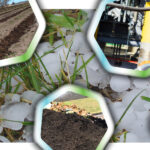
BioCycle December 2015
Nora Goldstein
World Soil Day on December 5, 2015 marked the official end of the International Year of Soils (IYS), an initiative of the Food and Agriculture Organization (FAO) of the United Nations. In an assessment of what was accomplished in the IYS, the FAO commented: “It’s been an exciting year packed with soil-themed initiatives that have taken place across the globe,” adding that the year began with a challenge from FAO Director-General, José Graziano da Silva to give a voice to a “nearly forgotten resource” by more investment in sustainable soil management and awareness raising activities. The three main accomplishments of the IYS, notes FAO: A deep and newfound appreciation for our soils; A wealth of informational material; and Friends, partnerships and linkages.
Throughout the IYS, connections were made between healthy soils and food production, and between amending soils with organic matter and carbon sequestration. Most of the world’s soils are depleted, and compost and other soil amendments derived from municipal, agricultural, commercial, institutional and industrial organic waste streams play a critical role in rebuilding soil health. This isn’t new news to BioCycle readers, but having the IYS informational resources that highlight these connections are new, along with new partners that have emerged to help spread the word.
Concurrent with the attention paid to soils in 2015 is the increased attention to wasted food, and the opportunities to rescue it before it becomes food waste. The Food Recovery Summit in Charleston, South Carolina last month was an awesome opportunity for learning and robust discussions. And then today, just as we are going to press, Congresswoman Chellie Pingree introduced H.R. 4184, the Food Recovery Act of 2015 Pingree’s bill includes practical and achievable steps to reduce food waste, feed millions of food-insecure Americans, and direct inedible food to organics recycling … to help build healthy soils to grow more food.
In a summary of the Food Recovery Act elements, Pingree gives voice to a sensitivity that BioCycle explored in depth in 2015 via our two “Food For People, Food For Soil” (F4P-F4S) Workshops (April 13 in Portland, OR and October 19 in Boston North Shore). Pingree’s bill supports food waste-to-energy projects (i.e., anaerobic digestion), while “ensuring that edible food that could feed hungry people is not being diverted to energy production” — or composting for that matter. A key theme of BioCycle’s F4P-F4S Workshops was to address the sensitivity of a “competition” for food feedstocks by identifying opportunities for collaboration between the food recovery/rescue community and the organics recycling community.
Our keynote at the October F4P-F4S workshop was Doug Rauch, founder of the Daily Table and former president of Trader Joes. We discussed this sensitivity on a preworkshop conference call with Rauch. His response sums up why 2015 has been the Year Of Soil — And Food:
“’Food For People, Food For Soil’ is a symbiotic response to several systemic issues in the United States — hunger, wasted food and depleted soils. Working together, the Food For People and the Food For Soil communities create a multiplier effect to leverage each others’ individual resources to have a greater impact.”
Happy Holidays, and all our best wishes for a Happy New Year.









